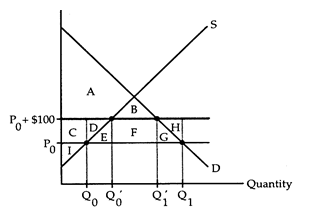If business taxes rise in a large open economy, it causes the current account to ________ and saving to ________
A) fall; fall
B) rise; remain unchanged
C) fall; remain unchanged
D) rise; fall
D
You might also like to view...
Assume that the expectation of a recession next year causes business investments and household consumption to fall, as well as the financing to support it. If the nation has low mobility international capital markets and a fixed exchange rate system, what happens to the quantity of real loanable funds per time period and current international transactions in the context of the Three-Sector-Model?
a. The quantity of real loanable funds per time period falls and current international transactions become more positive (or less negative). b. The quantity of real loanable funds per time period rises and current international transactions become more negative (or less positive). c. The quantity of real loanable funds per time period and current international transactions remain the same. d. The quantity of real loanable funds per time period rises and current international transactions remain the same. e. There is not enough information to determine what happens to these two macroeconomic variables.
The accompanying diagram shows the U.S. market for automobiles. P0 is the world price of automobiles, Q0 is the quantity of American automobiles produced, and Q1 - Q0 is the quantity of automobiles imported. Consumers are indifferent between American and imported automobiles, but each imported automobile creates $100 of pollution costs.

(i) Calculate consumers' surplus, producers' surplus, the pollution damages, and social gain when no attempt is made to internalize the externality.
(ii) Suppose the government imposes a $100 tariff on imported automobiles. Calculate consumers' surplus, producers' surplus, tariff revenue, the pollution damages, and social gain in this situation. Did the tariff increase social gain? Did the tariff result in an efficient outcome? Explain.